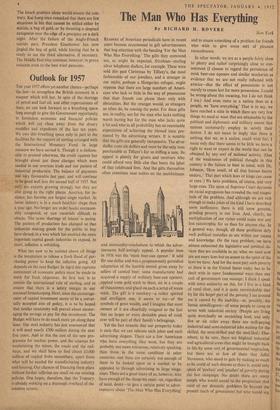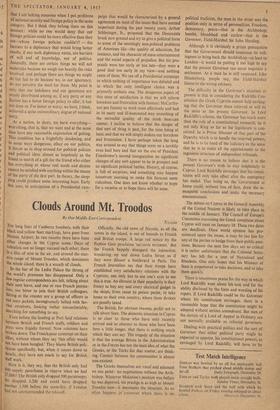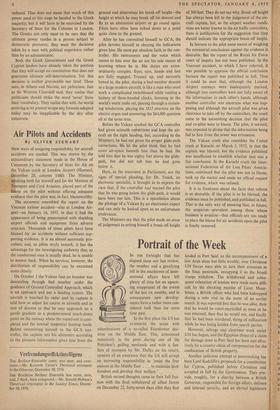The Man Who Has Everything
By RICHARD H. ROVERE New York READERS of American periodicals have in recent years become accustomed to gift advertisements that beg attention with the heading 'For the Man Who Has Everything.' The gifts they commend are, as might be expected, frivolous—sterling silver telephone diallers, for example. These were sold this past Christmas by Tiffany's, the most fashionable of our jewellers, and a stranger in our midst, perhaps a Hungarian refugee, might suppose that there are large numbers of Ameri- cans who lack so little in the way of possessions that their friends can please them only with absurdities. But the stranger would, as strangers so often do, be missing the point. For these gifts are, in reality, not for the man who lacks nothing worth having but for the man who lacks quite a bit and who in all probability has no reasonable expectation of achieving the blessed state pre- sumed by the advertising writers. It is notable that the gifts are generally inexpensive. The silver dialler costs six dollars and must be the only item purchasable at Tiffany's for so trifling a sum. Its appeal is plainly for givers and receivers who could afford very little else that bears the label of that celebrated firm. And the gifts themselves often constitute neat satires on the snobbishness and commodity-mindedness to which the adver- tisements half-jestingly appeal. A popular item. in 1956 was the 'mink beer-can opener.' It sold fbr one dollar and was a preposterously garnished adaptation of the humble utensil given away by sellers of canned beer; some manufacturer had acquired a supply of ordinary beer-can openers, applied some gold wash to them, set in a couple of rhinestones, and glued on each a scrap of waste mink. The gift is a mockery—a rather spirited and intelligent one, it seems to me—of the symbols of great wealth, and I imagine that most owners of it are cheerfully resigned to the fact that no larger or more desirable piece of mink ever will be part of their family's belongings.
Yet the fact remains that our prosperity today is such that we can tolerate such jokes and such advertising slogans. There are a few Americans who have everything they want, but they are probably not more numerous, relatively speaking, than those in the same condition in other countries, and there arc certainly not enough of them to be looked upon as a marker to be appealed to through advertising in large maga- zines. There arc a great many of us, however, who have enough of the things we need—or, regardless of need, desire—to give a certain point to adver- tisements about 'The Man Who Has Everything', and to create something of a problem for friends who wish to give some sort of pleasant remembrance.
In other words, we are as a people fairly close to plenty and rather surprisingly close to con- tentment (I choose to regard the prevalence of mink beer-can openers and similar mockeries as evidence that we are not really inflamed with avarice—that the effect of possessions is not merely to create lust for more possessions. I could be wrong about this meaning, but I do not think I am.) And even more as a nation than as a people, we 'have everything.' That is to say, we have reached a state in which there arc very few things we need or want that are obtainable by the political and diplomatic and military means that nations customarily employ to satisfy their desires. I do not mean to imply that there is nothing that we, as a nation, could wish for; I mean only that there seems to be little we have a right to want or expect in the world that can be obtained by any sort of national activity. (One of the weaknesses of political thought in this century is the failure to bear in mind, with Dr. Johnson, 'How small, of all that human hearts endure,/ That part which laws or kings can cause or cure.') We have problems, of course, and very large ones. The spate of Supreme Court decisions on racial segregation has revealed the real magni- tude of the problem. And although we are rich enough to make jokes of the kind I have described seem inoffensive, there is still some genuine, grinding poverty in our lives. And, clearly, no multiplication of our riches could make war any less catastrophic for us than for anyone else. In a general way, though, all these problems defy b such political remedies as are within our means and knowledge. On the race problem, we have (.1 almost exhausted the legislative and juridical de- vices that are available to us; what we need now is are not more laws but an assent to the spirit of the si laws we have. And for the most part such poverty tt as there is in the United States today has to be dealt with in more fundamental ways than any unit of government can manage; I think I speak with some authority on this, for I live in a kind of rural slum, and it is quite unmistakable that by far the larger part of the poverty I see around me is caused by the inability—or, possibly, the heroic unwillingness—of some people to come to terms with industrial society. (People are living quite wretchedly on unyielding land, and only five or six miles' away there are well-paying industrial and semi-industrial jobs waiting for the skilled, the semi-skilled and the unskilled.) Else- where, to be sure, there are blighted industrial and agricultural areasthat might be brought back to life by some sort of governmental respiration, but there are so few of them that Adlai Stevenson, who stood to gain by making as much speak of 'pockets' and 'patches' of poverty during the last campaign., No doubt there arc many most of our domestic problems lie beyond the present reach of government but who would say as he could of such distress as there is, could only people who would assent to the proposition that an that I am talking nonsense when I put.problems of national security and foreign policy in the same category. But I think they belong there on this account: while no one would deny that our foreign policies could be more effective than they are—whose foreign policies couldn't? — the barriers to a diplomacy that would bring better results, if any such diplomacy exists, are barriers of will and of knowledge, not of politics. Assuredly, there are certain things we will not undertake because we weigh too heavily the risks involved, and perhaps there arc things we might do but fail to do because we, in our ignorance, do not perceive the need for them. My point is only that our indolence and our ignorance are evenly distributed among us; if any party or any faction has a better foreign policy to offer, it has not done so. For better or worse, we have, I think, achieved a quite extraordinary degree of national unity.
As a nation, in short, we have everything— everything, that is, that we want and at the same time have any reasonable expectation of getting. This condition has a frightfully deadening, and in some ways dangerous, effect on our politics. It forces us to shop around for political policies and political ideas almost as hopelessly as the friend in search of a gift for the friend who either has everything or whose real needs and desires cannot be satisfied with anything within the means of the party of the first part. In theory, the shop- ping could produce some interesting buys. Early this year, in anticipation of a Presidential cam- paign that would be characterised by a general agreement on most of the issues that have seemed important during the past twenty years, Arthur Schlesinger, Jr., proposed that the Democrats break new ground and try to give a political form to some of the seemingly non-political problems of American life—the quality of education, for instance, and the character of mass entertainment and the social aspects of prejudice. But his pro- posals were too early or too late—they were a good deal too early in my view—and nothing came of them. We ran off a Presidential campaign in which nothing of importance was debated and in which the only intelligent choice was a primarily xsthetic one. The dangerous aspect of this state of satisfaction is that we will relieve boredom and frustration with fantasy; McCarthy- ism put fantasy to work most effectively and had in its nasty and ill-humoured way something of the surrealist quality of the mink beer-can opener. I incline to believe that the danger of that sort of thing is past, for the time being at least, and that we will simply endure our boredom and frustration. I have perhaps taken the long way around to say that things seem on a terribly even keel here and that on the eve of President Eisenhower's second inauguration no significant changes of any sort appear to be in prospect and no significant political battles. History, of course, is full of surprises, and something may happen tomorrow morning to make this forecast seem ridiculous. One does not know whether to hope for a surprise or to hope there will be none. political tradition, the man in the street sees the position only in terms of personalities. Freedom, democracy, peace—that is the Archbishop; bombs, bloodshed and curfew—that is the Governor, Field-Marshal Sir John Harding.
Although it is obviously a prime prerequisite that the Government should announce its will- ingness to bring back the Archbishop—at least to London—it would be, putting it too high to say that the present Governor can never negotiate a settlement. As a man he is still respected. Like Hindenburg, people say, this Field-Marshal listens to the wrong advisers.
The difficulty in the Governor's situation at present is that in considering the Radcliffe Con- stitution the Greek Cypriots cannot help envisag- ing that the Governor there referred to will be the same as the present Governor. In Lord Radcliffe's scheme, the Governor has much more than the role of a constitutional monarch; he is not only King so far as the legislature is con- cerned; he is Prime Minister of that part of 'the Dyarchy which is to handle the reserved powers, and he is to be head of the judiciary the sense that he is to make all the appointments to the ingenious structure of independent tribunals.
There is no reason to believe that it is the present Governor's wish to stay indefinitely in Cyprus. Lord Radcliffe envisages that his consti- tution will only take effect after the emergency has ended. That being so, the Government at home could, without loss of face, draw the in- escapable conclusions and make the necessary announcement.
The debate on Cyprus in the General Assembly of the United Nations is likely to take place in the middle of January. The Council of Europe's Committee examining the Greek complaint about Cyprus will meet on January 18. These two dates are deadlines. Once world opinion has pro- nounced upon the issues, it may be too late for any of the parties to budge from their public posi- tions. Because the next few days are so critical it is rather unfortunate that the Colonial Secre- tary has left for a tour of Nyasaland and Rhodesia. One only hopes that his Minister of State is empowered to 'take decisions, and to take them quickly.
There is unanimous praise for the way in which Lord Radcliffe went about his task and for the ability disclosed by the form and wording of his report. If Lord Radcliffe could be the Governor whom his constitution envisages, there is a reasonable hope that the constitution might be adopted without serious amendment. But men of the stature of a Lord of Appeal in Ordinary are not normally available as colonial governors.
Dealing with practical politics and the sort of Governor that either political party might be expected to appoint, his constitutional powers, as envisaged by Lord Radcliffe, will have to be reduced. That does not mean that much of this power need at this stage be handed to the Greek majority; but it will have to be exercised by. the Secretary of State for the Colonies in London. The Greeks not only want to be sure that the ultimate power resides in a person subject to democratic pressures; they want the decisions taken by a man with political experience rather than by an administrator.
Both the Greek Government and the Greek Cypriot leaders have already taken the position that they will accept no constitution that does not guarantee ultimate self-determination. Yet this decision is neither irrevocable nor fatal. These men, in Athens and Nicosia, are politicians. Just as Sir Winston Churchill said, they realise that politicians should strike the word 'never' from their vocabulary. They realise that with the world evolving at its present tempo any formula adopted today may be inapplicable by the day after tomorrow.
















































 Previous page
Previous page